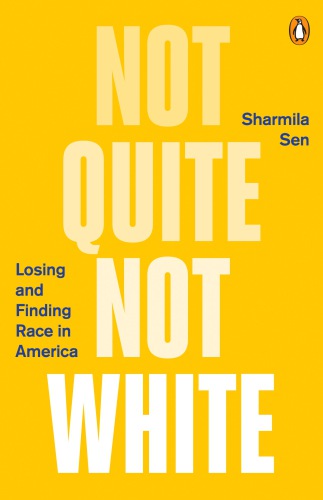
Not Quite Not White
Losing and Finding Race in America
کتاب های مرتبط
- اطلاعات
- نقد و بررسی
- دیدگاه کاربران
نقد و بررسی

April 16, 2018
Sen, executive editor-at-large of Harvard University Press, depicts her early life in Calcutta, India, and her experiences as a young immigrant in the United States in this captivating memoir. As a young girl in Calcutta in the 1970s, Sen benefited from immense privilege based on her caste, her father’s income, and her ability to speak English. She paints a vivid and often disturbing picture of poverty in India and the ways in which she excelled merely because of her circumstances. An incident when she sits on her bed and observes a servant boy about her age angrily sweep the floor of her room leaves an indelible mark on her consciousness. Upon her family’s emigration to Cambridge, Mass., when she is 12 years old, Sen’s worldview flips to one where she is a minority, and race becomes a focal point of her life. She and her family struggle to learn the ways of whiteness in an attempt to assimilate, from modifying their accents to adopting an American cuisine that consists mostly of Bisquick mixes and Campbell soups. Readers interested in first-generation immigrant stories will enjoy this heartfelt account of how newcomers carve a space for themselves in the melting pot of America.

July 1, 2018
In her first book, Sen (executive editor at large, Harvard Univ. Pr.) chronicles her experience immigrating to the United States with her family just before her teenage years, and the journey toward understanding her racial identity as an Indian American in a country based on whiteness. Sen's story contrasts her middle-class upbringing in Calcutta to her working-class life in Cambridge, MA. Her background as an English professor adds to the narrative, which weaves clever quips and literary comparisons; for example, she references James Weldon Johnson's Autobiography of an Ex-Colored Man, in which the main character tried to define himself in a white-dominated culture by creating an air of superiority. Sen also discusses India's history of caste and colonization, the country's conflicts and contradictions, and the issue of colorism and trying to pass as white. With humor, historical context of U.S.-India migration, and references to the 1980s, this memoir shares the lesser-told Indian experience of assimilation and cultural acceptance into American society. In doing so, Sen provides insights less acknowledged in conversations of race in America. VERDICT An insightful, engaging story for those interested in racial identity and first-generation immigration narratives.--Tiffeni Fontno, Boston Coll.
Copyright 2018 Library Journal, LLC Used with permission.

July 1, 2018
A former Harvard professor ruminates on race in America from her perspective as a Southeast Asian woman.Before Sen, the executive editor at large at Harvard University Press, immigrated to the United States in 1982, she had never used race-based labels to identify herself. In her native Calcutta, people identified each other by the languages they spoke or the gods they worshipped. Through a series of four intertwined personal essays, the author traces her evolution from Indian immigrant to resisting "Not White" American. Sen begins in 1970s India, which she recalls as a place where a child's future success depended on getting into schools that taught English. By knowing a few words of this colonial language, Sen was able to matriculate at a Catholic school where the main divide was between Hindu and Christian Indians. After relocating with her parents to Boston, Sen realized that she and her family--who were neither "chic expats [nor] political dissidents with lofty ideologies"--were in America for the most mundane of reasons: to improve their economic status. Desperate to fit in, the author immediately set about "acquir[ing] a new American accent" by watching shows like General Hospital and Happy Days. During high school, college, and graduate school, Sen became increasingly aware of the American minefield of race. As she "silently accepted the badge of honorary whiteness," she also learned to expose small parts of her culture in ways that made her seem less like an exotic "other" willing to play into pre-existing Indian stereotypes and more like "a brown woman mimicking a white man pretending to be a brown man." She eventually channeled her rage at being forced into whiteface performance by calling herself "Not White." In naming whiteness, she realized that she could challenge both the dominant culture's "powerful invisibility" and its monopoly on the title "American." Timely and eloquent, Sen's book is a welcome addition to the growing body of literature that engages with the topic of race from outside the white/black binary.Insightful, relevant reading for these times.
COPYRIGHT(2018) Kirkus Reviews, ALL RIGHTS RESERVED.

July 1, 2018
Currently executive editor-at-large at Harvard University Press, Sen grew up in Calcutta, an upper-caste Hindu Bengali. She writes evocatively about her life there before her family immigrated to the U.S. in 1982 when she was nearly 12, ashamed that her family had to leave their country for economic reasons. It is in America, her new home, that she encounters race for the first time, discovering she is a minority, not quite white but not quite not white. Nevertheless, as she had in India, she excels at school but finds herself not fitting in. She dreams of becoming a wealthy white woman (thanks to her light skin, she can pass for white) and is determined to assimilate as quickly as possible, watching television voraciously to burnish her American bona fides. Hers is a not an atypical immigrant story?she is focused on trying to determine who she is?but it is marked by her fierce intelligence and arresting insights. In the end she decides she is an American because she knows she is Not White. The knowledge makes her smile.(Reprinted with permission of Booklist, copyright 2018, American Library Association.)

























دیدگاه کاربران